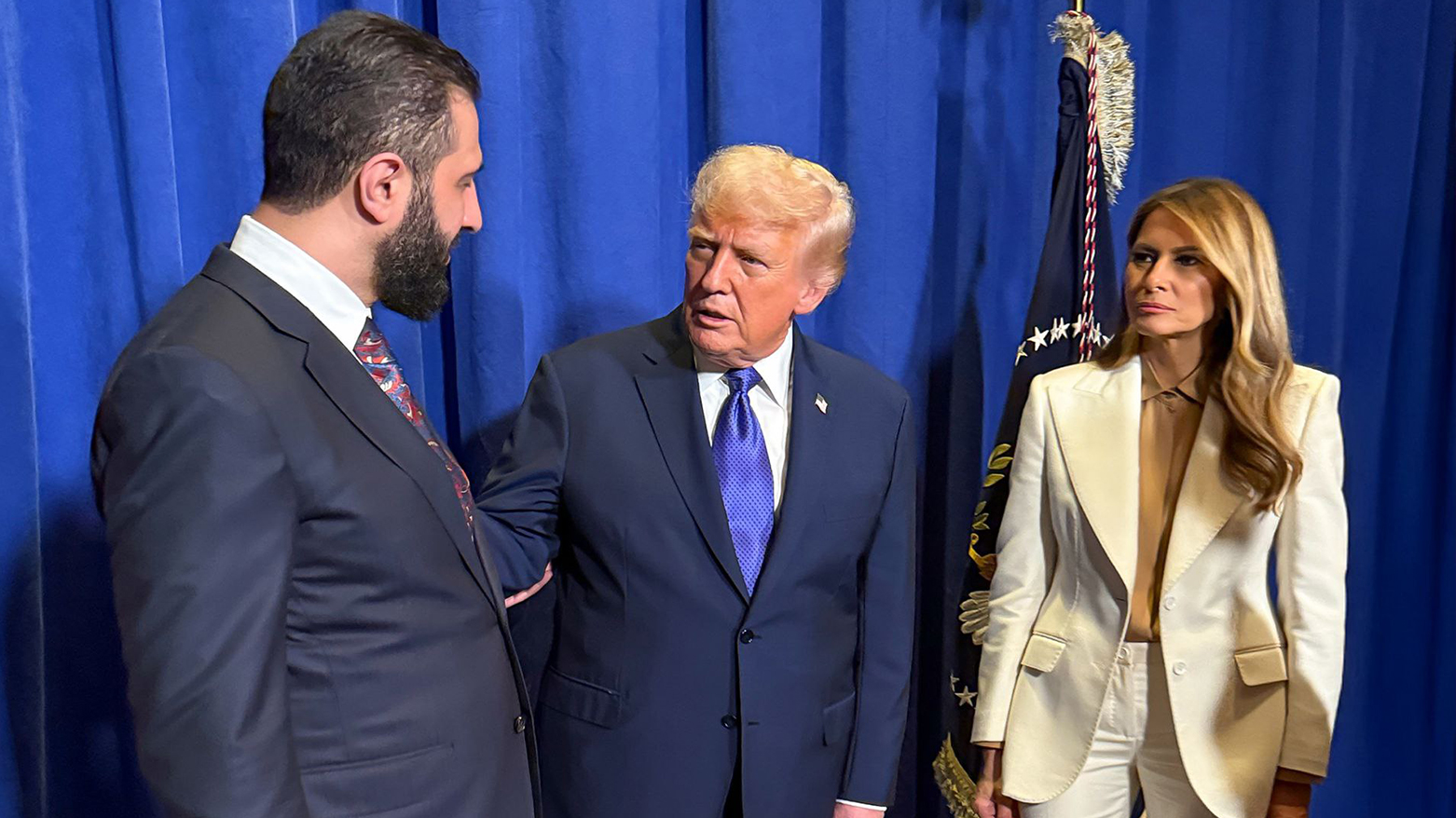Syrian President al-Sharaa Meets Trump in New York, Delivers Defining UN Address
Syrian President al-Sharaa met with President Trump at the UNGA, his second such encounter. In his assembly address, he outlined Syria's transition, pledging justice for past atrocities, economic reconstruction, and a "new chapter" while warning of Israeli threats.

ERBIL (Kurdistan24) – Syrian Interim President Ahmad al-Sharaa met with U.S. President Donald Trump and First Lady Melania on Wednesday in New York on the sidelines of the 80th session of the United Nations General Assembly, in what marked their second encounter following a previous meeting in Riyadh in May. The Syrian state news agency SANA reported that al-Sharaa exchanged greetings with the American president during an official reception before world leaders, setting the tone for a day dominated by his landmark address at the Assembly.
Opening his speech with deeply emotive language, al-Sharaa declared, “The Syrian story is one where pain intertwines with hope, and where a struggle between good and evil has defined our modern history.” He framed Syria’s past six decades as a tragic confrontation between a repressive regime and a people seeking freedom and dignity.
He described the former government as a “tyrannical system” that killed nearly one million citizens, displaced 14 million, destroyed two million homes, and carried out more than 200 chemical weapons attacks. “Our children, women, and youth inhaled poison gas, while explosive barrels and executions became tools of rule,” he said, accusing the old regime of inviting foreign militias, spreading narcotics, and plunging Syria into sectarian and ethnic strife.
Al-Sharaa hailed the popular uprising that toppled the previous regime as a historic confrontation carried out with mercy and restraint. He stressed that the decisive military campaign avoided civilian casualties, “a battle filled with forgiveness and reconciliation” that dismantled six decades of oppression and turned Syria from an exporter of crises into “a historic opportunity for peace and prosperity.”
He declared the outcome a victory not only for Syrians but for humanity: “We triumphed for the oppressed, for the mothers of martyrs, and for all those displaced. We destroyed the narcotics trade that once plagued our region and opened the path for refugees to return to their homes.”
The Syrian president pledged that all perpetrators of atrocities would face justice, announcing the creation of a national commission for transitional justice and another for the missing. He highlighted preparations for legislative elections, the restructuring of civil and military institutions, and the principle of placing all weapons under the state’s authority.
He outlined his government’s pillars as balanced diplomacy, security stabilization, and economic development. Al-Sharaa emphasized that Syria had already reestablished international relations and secured the gradual lifting of sanctions, while calling for their complete removal. “Sanctions should not be chains restraining the Syrian people or confiscating their freedom,” he asserted.
Al-Sharaa further announced amended investment laws that have opened the Syrian market to regional and global companies, with reconstruction projects already underway. He described the rebuilding process as a founding moment for “a new Syrian state of law and equal rights,” closing the chapter on decades of repression.
Turning to foreign policy, al-Sharaa warned of continued Israeli attacks since December, accusing Israel of exploiting Syria’s transitional stage to destabilize the region. He reaffirmed Damascus’ commitment to the 1974 disengagement agreement, stressing that Syria would resist threats through diplomacy but demanded that its sovereignty and territorial unity be respected.
He urged the international community to support Syria against such dangers, cautioning that Israeli policies risk dragging the Middle East into new cycles of war.
Al-Sharaa expressed gratitude to countries that supported Syrians throughout their struggle, singling out Turkey, Qatar, Saudi Arabia, the United States, the European Union, and other Arab and Islamic states. “On behalf of the Syrian people, I extend thanks to every nation and people who stood with us in our darkest days,” he said.
Drawing a parallel between Syria’s suffering and the plight of Palestinians, he declared: “We, who endured war and destruction, support the people of Gaza—its children, its women, its civilians. We call for an immediate end to war and for the protection of the innocent.”
Concluding his speech, al-Sharaa proclaimed that Syria had entered a new chapter of peace, prosperity, and development. Quoting scripture, he declared: “Truth has come, and falsehood has perished. Syria today reclaims its rightful place among nations.”
He portrayed Syria’s revival as the embodiment of resilience, justice, and national pride, emphasizing that the “Syrian story” remains ongoing but is now defined by hope, reconstruction, and a renewed commitment to humanity.
By meeting with Trump and delivering a speech of both historical reckoning and future vision, al-Sharaa sought to present Syria as a nation reborn from tragedy, ready to reengage with the world while firmly resisting external threats.